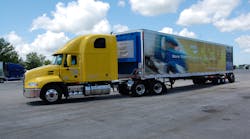All regulations are not created equal. While the trucking industry has been victimized by too many costly rules, the electronic stability control mandate should be considered a positive development, offering benefits at a relatively low cost.
That was one of the messages shared by Fred Andersky, an executive with Bendix Commercial Vehicle Systems, during a conference call last week hosted by with Stifel analyst Mike Baudendistel.
Also during the call, Andersky said the absence of new leadership at the Federal Motor Carrier Safety Administration (FMCSA) and National Highway Traffic Safety Administration (NHTSA) should not be considered a good thing.
“There is a lot happening with technology - with automated types of driving. We need to have some level of regulatory oversight in these areas,” said Andersky, who is Bendix’s director of customer solutions - controls and director of government and industry affairs.
He singled out anti-lock brakes as an example of how government action requiring the equipment was the right thing for highway safety.
Looking at the current environment, he suggested the lack of permanent FMCSA and NHTSA administrators could delay further development of the Department of Transportation’s automated vehicles policy, which sets the framework for deployment of advanced technologies.
“The government plays a role in helping getting technology adopted,” he said.
Meanwhile, an estimated 35% to 40% new trucks being produced today include electronic stability control, a figure that Andersky said has “flat lined” in recent years. Bendix’s branded product is the Electronic Stability Program (ESP).
That figure will rise dramatically in August, when a federal mandate starts being phased-in, requiring new trucks be equipped with an ESC system to lessen swerving and rollover accidents. The rule calls for new 6x4 tractors to have ESC starting in Aug. 1, though there is no requirement for retrofitting existing equipment. The systems will be required on Class 8 motor coaches in June 2018, and all remaining tractors and Class 7 trucks by August 2019.
While the cost may be a bit higher than the $550 the government initially estimated, Andersky said it will more than pay for itself with fewer accidents and lower insurance costs. He added that straight trucks and vocational vehicles should have been included in the mandate.
In 2015, there were over 9,000 rollover and 1,000 jackknife incidents, many of which could have been avoided with ESC, he said.
He added ESC “gives us the ability to move forward with additional technologies” that will assist the driver and avoid accidents. That includes collision mitigation systems, featured on around one-third of new trucks currently.
Statistics from one fleet that tested collision mitigation found it reduced rear-end crashes by about 70%, while also cutting by 70% the severity of the remaining 30% of crashes.



